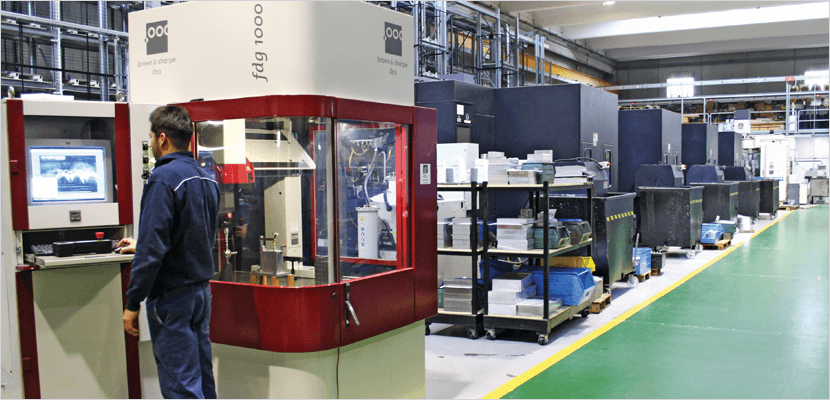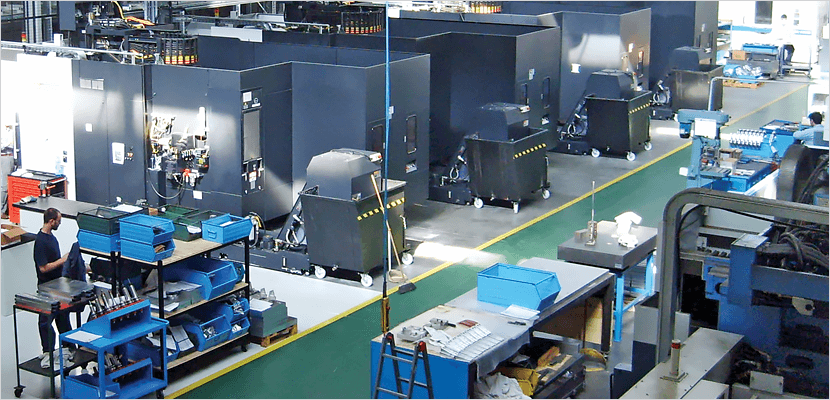150 pallets in the FMS – productivity takes off
A. Abete Srl chose the Fastems automation system based on MLS to maximize the production capacity of its machine tools. With an increase in productivity of over 150% on the previous setup and the same for its machining centers, this goal was most definitely reached.
It is not always feasible to develop so-called “traditional” automation systems. This is especially true when working with limited production runs, for certain types of intensive production, based on anthropomorphous robots for example. That is why more and more companies choose a more profitable automation model based on Flexible Manufacturing Systems (FMS). This was the case with Abete, the time-tested Italian company specialized in the production of components for the aeronautical sector. Thanks to a Fastems FMS multi-level (MLS), Abete more than doubled their output for half the industrialization time and these results were obtained without having to add even one machine to the line.
Problems solved
- Increase of machine tool utilization up to 7.000 hours per machine per year (4 machines x 7.000 = 28.000 hour capacity per year).
- Quick time-to-market for new products.
- Less overhead costs due to better utilization of floor space and time – more production in less space and time.
- Better quality control of produced parts.
Why Fastems?
- Freedom to choose any machine tool make.
- Quick recovery from production stops because of Teleservice.
- High-class control software for managing production.

Machine tools: capacity increases to 80%
Abete produces components and assemblies used in the engines and structural parts of planes (fuselage, wings, fins on primary and secondary structures). Their end users include both civil and military sectors in major aeronautical development programs – think Boeing 787 and Airbus A380. Over all, the company has produced over 4,000 parts, most of which have to respect the very strictest design specifications. Giovanni Abete, CEO, explains: “Our customers need a fast service with relatively small runs, real one-offs in some cases. It is hard to predict part requirements in the aeronautical sector. In many cases, you have to meet the customer’s requirements for the immediate supply on a line where they have found a reject during assembly or an unexpected request for a plane on the ground for repairs”.
Managing these types of variables can involve problems, especially in terms of retooling times. This is why Abete chose the Fastems FMS system, to meet two distinct priorities: on one hand, to reduce set-up times to a minimum to maximize machine operating time, and on the other, to optimize the use of space. Thanks to Fastems, Abete found the perfect balance between these two priorities and can now count on an extremely compact 24 x 7 automation system: four 5-axis machines (Mazak Variaxis 730) integrated with a FMS based on a multi-level system (MLS). The MLS is 6 meters high (and 25 meters long) that can hold up to 150 pallets on 6 levels. This configuration was designed to operate at an estimated capacity of 80% of the hypothetical max. production output. “With four machines now available” – says Giovanni Abete – “we have a theoretical potential output of 35,040 hours/year. The Fastems FMS means we can realistically aim to achieve an output of 28,000 hours/year, including downtime for maintenance, troubleshooting, and holidays. To obtain the same results using stand-alone machines, we would need at least 10 units with just as many operators, meaning an obvious increase in costs”.
Industrialization times reduced by over 50%
The implementation of the Fastems automation system took roughly 7 months for Abete, from the start of the planning stage to the first system start-up. The development was made easier by the use of zero-point plates, an option that made the investment sustainable, also in terms of costs.
In its current state, the system gives us a considerable reduction in set-up times. With 150 pallets available and always in line, Abete can use 120 tools per machine with a wide range of common logic functions. Furthermore, thanks to the extended pallet availability, the company can run all kinds of tests in the time required for the test alone. Unlike stand-alone machines, where operators have to stop production to correct errors and tweak the setup, with the FMS, work can continue from where it was stopped. This means a 50-60% reduction in industrialization times.
Immediate benefits, also from a qualitative point of view
The considerable reduction in lead times has improved efficiency in terms of spindle working hours, with a reduction in plant amortization times as a consequence. At our current level of saturation, we estimate being able to pay off the investment in approximately 3 years. “In the mechanical field” – emphasizes the company manager – “what counts is really only the movement of the tool in contact with the metal, all the rest is work done free for the market. For a company like Abete, operating on production runs of 20/30 workpieces of each type, with machines that may never be used to their full potential for 50% or more of their life cycle, this can be a problem. In this sense, the Fastems FMS is the only way for us to make the most of the whole working week, including nighttime and holidays, when the machines are not usually attended by operators”.
While the advantages in terms of productivity are obvious, there has also been a significant step forward in terms of quality. The Fastems FMS drastically reduces the number of elements that can lead to flaws in the finished workpiece. In particular, being able to keep the pallets where they are limits positioning errors caused by continuous set-up corrections, especially for tools. In the words of Abete: “Quality in this sector means reducing any chance of error right back to the roots of the question. Retooling a stand-alone machine increases the risks in the subsequent start-up phase, while the FMS lets us use a considerable number of tools in the machines without ever having to remove them from the production line. The same presetting values can be used and called up again. For production control and the planning office, this means being able to meet customers’ requirements almost instantaneously. In fact, all the components we produce for the aeronautical industry with a certain frequency are ready to go into production at a moment’s notice”.
Real-time support, thanks to the remote support system
Four operators, two on each shift, manage the whole plant: loading and unloading workpieces, running intermediate controls and system supervisor controls. When a request is received from production control and the planning office, each operator has all the elements required to manufacture the workpiece, enter the data in the system, and develop the plant schedule. The production engineer can also load test programs autonomously after having received suitable training on the operating mode. This means a reduction in lead times when new designs go into production.
The plant diagnostic system sends any alarms (machine shutdown, offline, or tool breakage) to the operators by SMS and e-mail. Furthermore, the integration of the remote support system provides constant support for personnel when troubleshooting (the machine tools are connected by a dual Ethernet board to the company system and the Fastems unit). The Fastems staff can connect to the Abete PC directly from their headquarters in Finland, to troubleshoot and provide step-by-step programming support.
A new mindset
The integration of an FMS in the very heart of the production unit has given Abete a chance to not only test a completely new automation model for the company’s technological background, but also radically rethink its development policies. From the idea that increasing the level of productivity means increasing the number of machine tools, the company can now consider development in different terms, where the primary objective is to optimize existing resources. Feedback from the field has also made it possible to establish the reliability of the current Fastems flexible production systems in terms of quality. This is an essential requirement in a sector where components must meet the strictest standards and regulations all along the supply chain.
“With this level of technology”, says Giovanni Abete, “we can compete at an international level also in business areas and countries where the focus is on low-cost policies. When it comes to removing chips with machine tools, we can now count on all our know-how without having to worry about lead times”.

“The Fastems FMS means we can realistically aim to achieve an output of 28,000 hours/year, including downtime for maintenance, troubleshooting, and holidays.”
Related products:
"*" indica i campi obbligatori